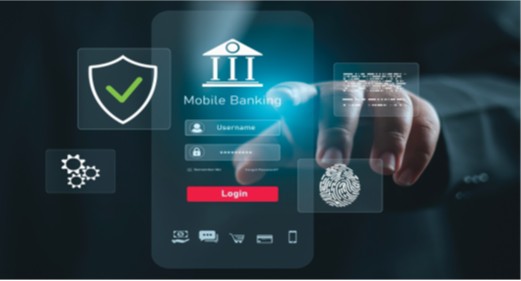


Management Practice Insights
DOI: 10.59571/mpi.v3i2.9
Year: 2025, Volume: 3, Issue: 2, Pages: 95-101
Original Article
Aditi Divatiai*, Sankalpa Saha, Subhadip Banik & Koustav Kundu
i S.P. Jain Institute of Management and Research
* Corresponding author: [email protected]
Received Date:03 June 2025, Accepted Date:28 October 2025, Published Date:29 October 2025
The digitalisation of banking has not only created unprecedented efficiencies but also amplified cybersecurity risks, making data security a vital concern for financial institutions. As banking transactions migrate to digital platforms, cybercriminals exploit vulnerabilities in banking systems, resulting in financial fraud, data breaches, and regulatory non-compliance. The consequences of such breaches extend beyond monetary losses, eroding customer trust and disrupting essential banking operations.
Such cybercrimes also result in a paradox, according to the research by Sumit Agarwal, Pulak Ghosh, Tianyue Ruan, and Yunqi Zhang.1 They demonstrate that while data breaches trigger immediate behavioural shifts in the form of falling digital payment volumes, this effect is short-lived, as consumers ultimately prioritise convenience over security. Thus, the paradox: while security breaches impact customer confidence in the short term, digital adoption remains resilient over time. According to other research by Aitor Couce-Vieira, David Rios Insua, and Alex Kosgodagan, one way to resolve this paradox is for banks to manage cybersecurity risk proactively.2 Together, these studies underscore the urgency for banking institutions to fortify their cybersecurity infrastructure while maintaining seamless customer experiences.
Our essay demonstrates how aligning cybersecurity strategies with emerging technologies, such as artificial intelligence (AI) and blockchain, can enable banks to transition from a reactive approach to a proactive, risk-forecasting model that mitigates both financial and reputational risks.
1 Sumit Agarwal et al., “Transient Customer Response to Data Breaches of Their Information,” Management Science (Linthicum) 70, no. 6 (2024): 4105, ABI/INFORM Global (3072308211), https://doi.org/10.1287/mnsc.2021.01335.
2 Aitor Couce-Vieira et al., “Assessing and Forecasting Cybersecurity Impacts,” Decision Analysis 17, no. 4 (2020): 356–74, https://doi.org/10.1287/deca.2020.0418.
3 Kalyeena Makortoff, “‘We’Re Being Attacked All the Time’: How UK Banks Stop Hackers,” Business, The Guardian, June 15, 2025, https://www.theguardian.com/business/2025/jun/15/uk-banks-hackers-attacks-cybersecurity.
4 Ilias Tsingenopoulos et al., “On Adaptive Decision-Based Attacks and Defenses,” paper presented at 7th Deep Learning Security and Privacy Workshop, DLSP2024 IEEE-Security, IEEE, May 23, 2024, https://dlsp2024.ieee-security.org/papers/dls2024-final24.pdf.
5 Kalyeena Makortoff, “‘We’Re Being Attacked All the Time.’”
6 Companies Market Cap, “State Bank of India (SBIN.NS) - Market Capitalization,” August 4, 202 AD, https://companiesmarketcap.com/state-bank-of-india/marketcap/; ICICI, “Corporate Governance - Cyber Security,” February 27, 2023, https://www.icicibank.com/ms/icici-esg/cyber-security.html.
7 Companies Market Cap, “JPMorgan Chase (JPM) - Market Capitalization,” July 24, 2024, https://companiesmarketcap.com/jp-morgan-chase/marketcap/.
8 SBI, “Cyber Security - Personal Banking,” October 24, 2024, https://sbi.bank.in/web/personal-banking/cyber-security.
9 ICICI Bank, “Corporate Governance - Cyber Security,” Corporate ESG, February 27, 2023, https://www.icicibank.com/ms/icici-esg/cyber-security.html.
10 JPMC, Item 1C 10-K Cybersecurity GRC, 10-K Cybersecurity GRC (SEC, 2024), 0000019617-24-000225, https://www.board-cybersecurity.com/annual-reports/tracker/20240216-jpmorgan-chase--co-cybersecurity-10k/.
11 Emily Flitter and Karen Weise, “Capital One Data Breach Compromises Data of Over 100 Million,” Business, The New York Times, July 30, 2019, https://www.nytimes.com/2019/07/29/business/capital-one-data-breach-hacked.html.
12 Anshu Bansal, GDPR vs. HIPAA vs. CCPA vs. PCI: Compliance Differences, Compliance, May 16, 2024, https://www.clouddefense.ai/gdpr-vs-hipaa-vs-ccpa-vs-pci/.
13 Karine Brunet et al., CRI_AI-and-Gen-AI-in-Cybersecurity_15112024 (CapGemini Research Institute, 2024), https://www.capgemini.com/wp-content/uploads/2024/11/CRI_AI-and-gen-AI-in-cybersecurity_15112024.pdf.
© 2025 Published by SPJIMR. This is an open-access article under the CC BY license (https://creativecommons.org/licenses/by/4.0/)
Subscribe now for latest articles and news.